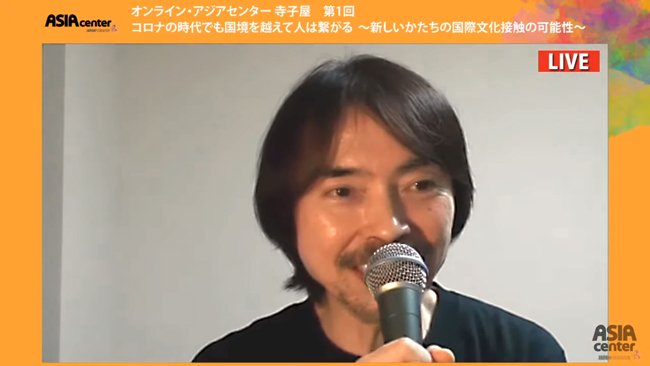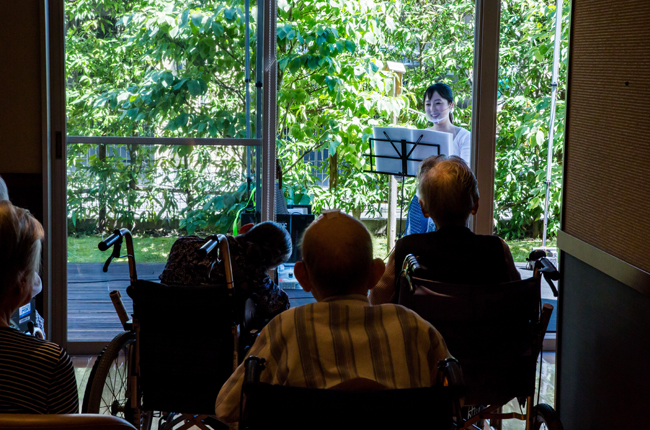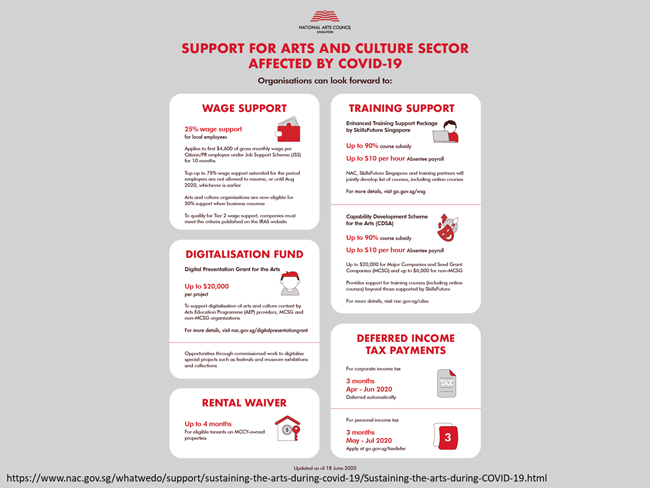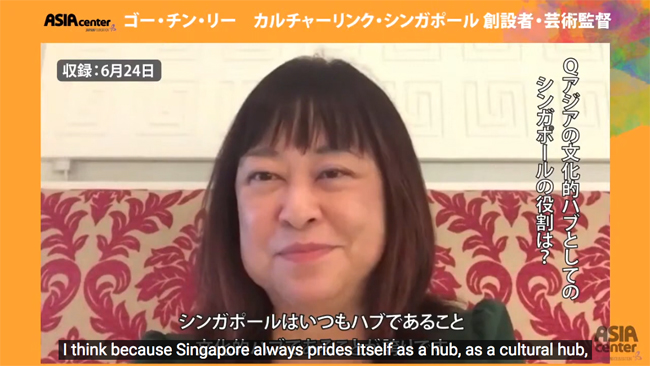MIYAGI Satoshi talked about his idea of theatre in this time of COVID-19 — and why he continues to be so busy even under today's conditions
As the general artistic director of Shizuoka Prefecture's public theatre, the Shizuoka Performing Arts Center (SPAC), Miyagi Satoshi talked about what has been happening at his Shizuoka City-based theatre during the recent self-restraint period. Based on his own experience of having to radically alter the form and content of SPAC's annual World Theatre Festival Shizuoka in May, he also discussed the important role of theatre and artists in many people's lives, even amid the current pandemic.

With foreign artists unable to travel to Japan, theatres closed, and people unable to visit SPAC due to the government's "Declaration of a State of Emergency" in April, Mr. Miyagi said that instead of SPAC's regular live festival in May he decided to run an event at the same time which he called World Theatre Festival on the Cloud, whose programs were mainly provided online.
He said that to avoid just distributing SPAC's past performances online, and instead create new programs, he paid special attention to safety by carefully avoiding any physical contact among the creators.
For instance, SPAC live-streamed talks between Mr. Miyagi and foreign artists who had been invited to the festival in May, but who were confined to their homes due to COVID-19. It also posted online live Zoom meetings between rising Japanese dramatists, and uploaded videos to the web introducing the work of its technical staff. And although SPAC's four theatres are still closed, the company has continued to share programs digitally ever since it first adopted the use of online platforms to present this year's irregular festival.
In fact Mr. Miyagi laughed as he admitted to naming this new approach "Uber Arts" in reference to the Uber Eats meals delivery service whose popularity has soared due to COVID-19. That was, he said, his counterintuitive idea for SPAC actors to deliver performances to people unable to visit theatres during this time of COVID-19.
For example, he said that SPAC actors were using FM radio-transmitter devices when they visited homes for the elderly so they could read or perform plays outside without risking the health of their elderly audiences by coming in close proximity — while residents confined to their beds could also enjoy the performances in that way.
In addition, Mr. Miyagi said SPAC actors have been posting reading performances on YouTube of junior and senior high school recommended texts; while also conducting free hour-long one-to-one play readings by telephone; and providing children with original handcraft kits created by SPAC's technical and arts team.
"My greatest fear was that people might think it was no problem if theatres were closed for a few months," Mr. Miyagi said. "So we need to reach out actively to let it been known that some people can't survive without theatre in this world."
For that reason of theatre's importance in society, he vowed that SPAC will continue to deliver "Uber Arts" for however long this pandemic lasts.

A pioneer of multidimensional arts declares the need for new digital arts in the future
Goh Ching Lee, the founder and executive & artistic director of Culture Link Singapore, a multidimensional international agency involved in production, management and consulting across a wide range of arts projects and festivals, sent a video message to the seminar.
Speaking from Singapore, one of Asia's leading artistic hubs, Ms. Goh talked about her forecast for the arts and theatre world in the post-pandemic era — including a specific example related to her current project.
In Singapore, the National Arts Council (NAC) oversees support plans for artists and workers in the arts and cultural sectors. On its website, it shows several wage-support and training-support plans, as well as a new digitalisation funding scheme. The latter aims to offer financial support to artists and arts companies wishing to digitalise their works in this time of COVID-19, and thanks to this many artists and arts festival organizers have been able to distribute past works online, allowing people to enjoy their archival gems. In addition, in the face of the pandemic some leading artists have started presenting online lectures.
Overall, the NAC is very positive about creating and distributing new digital content. Ms. Goh said digitalisation has become a very big movement in the arts world in Singapore, in part due to great support by the NAC.

Ms. Goh is now tackling a reworking of her co-produced international collaboration project from 2006 which was led by the London-based performance art and theatre company Station House Opera and also involved theatres from Singapore and Brazil. The work combined physical acting on stage with a virtual world showing three different live-streaming images on on-stage screens, so audiences saw both worlds at the same time. Now, Ms. Goh is working on a new version of that piece, and said she is very curious to discover how artists will learn to adapt to this COVID-19 environment with its travel restrictions and intermittent lockdowns.
Looking ahead, she said she would like to pursue new kinds of works, particularly in the digital, semi-digital and virtual spheres. Such works, she said, will be both virtual and real, and extensions of each other that neither repeat nor mirror the other. In that style, she said, it becomes easy to switch from physical to virtual presentations if a lockdown happens, then move back to the physical when restrictions are removed.
"We should try to open up the space for digital commissions or collaborations across the world. So, we need to look at how we can create additional support systems for international collaboration, whether virtually or in a real space, during the time of COVID-19," Ms. Goh said.

Matters to keep in mind: the digital divide implicit in switching to online theatre
Following on from his declared commitment to "Uber Arts," Mr. Miyagi was keen to point out an important aspect of digital arts delivery, saying, "We need to bear in mind the people who are not able to access digital devices."
He continued: "Those people are isolated now. I believe theatre is an art form that was started by people who felt isolated, so theatre people nowadays should not forget about people like them who feel isolated in today's society."
Ms. Yuasa agreed with Mr. Miyagi, pointing out that just as we value diversity and inclusion in society, we need to be mindful of the reality that there are people outside the reach of today's digital world.
"The term 'digital divide' refers to unequal digital access that is found all over the world, including among disabled and low-income people, and because of differences in age, gender, urban and rural populations, and those in advanced or developing countries.
"We need to consider how we can provide equal access to the elderly, the disabled, and a much wider range of people," she said.
And while acknowledging that many people now use Zoom meetings and online forums as useful tools of everyday life, Ms. Yuasa highlighted how such platforms disadvantage blind and deaf people, for instance.
So in conclusion, she said there are still so many problems we need to solve regarding digitalisation.
International cultural exchange from now on
Finally, at the conclusion of the first installment of the online seminar series, Mr. Miyagi spoke about the meaning of international cultural exchange today from his standpoint as an internationally active artist and general artistic director of the globe-trotting SPAC theatre company.
"For a while, I suppose that large-scale foreign tour productions and international exchange events will be hard to organize in the theatre world," he said. Nevertheless, he asserted that people would never stop doing international cultural exchanges even though some may initially hesitate to embark on expensive foreign tours.
"For example, Herbert von Karajan came alone to Japan in 1954 to perform his first work here, when he conducted the NHK Symphony Orchestra. It was so important that he actually came, because a human carries with them such a massive amount of information that when people encounter someone with so much that's different inside, they are fascinated and curious to peer into that mysterious other.
"I think that is the origin of the word 'respect.' Namely, to have an interest in others, or people and works from other countries, and to have a feeling of respect towards them. So, through international cultural exchange in the arts, people gain feelings of respect for others — and that is a really important role of the arts."
【Video Recording】
*English Subtitles Available
【Related links】
Shizuoka Performing Arts Center (SPAC)
Station House Opera:Play On Earth (2006)
TANAKA Nobuko
Tanaka Nobuko has been a full-time theatre journalist for more than 20 years since gaining an M.A. in Arts Management from the City University in London in 1999.
She has been writing stage reviews and features regularly for The Japan Times, Japan’s top-selling English-language daily newspaper, since 2001. She also writes Japanese- and English-language articles for stage magazines, other publications and websites, and translates and contributes to theater programs.
In addition she is currently the company manager for several Japanese artists who will perform in a Japan Festival at the Coronet Theatre in London in 2021. Her bilingual website is at www.jstages.com.






